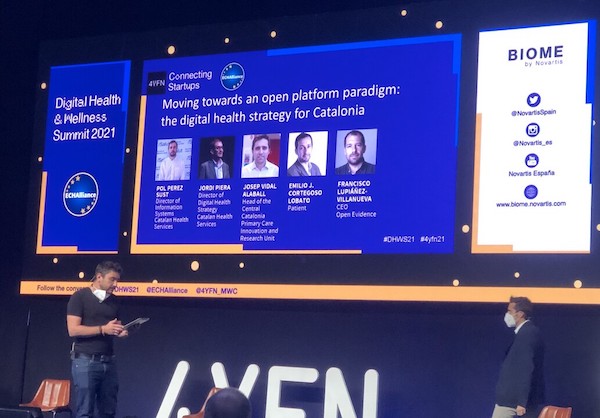Moving Towards An Open Platform Paradigm: The Digital Health Strategy For Catalonia
 Anže DroljcAt the 2021 Digital health & Wellness Summit 2021 (DHWS21) in Barcelona, it was clear that integrated care based on openEHR will be a major focus for Catalonia's healthcare. Catalonia is a globally respected region for its innovative approach to healthcare. The major challenge the region faces is similar to what most healthcare organizations are seeing: inability to share or access data between different systems.
Anže DroljcAt the 2021 Digital health & Wellness Summit 2021 (DHWS21) in Barcelona, it was clear that integrated care based on openEHR will be a major focus for Catalonia's healthcare. Catalonia is a globally respected region for its innovative approach to healthcare. The major challenge the region faces is similar to what most healthcare organizations are seeing: inability to share or access data between different systems.
At the panel discussion of Catalonia's digital strategy, Emilio Cortegoso, a patient who recently recovered from the coronavirus, presented his experience to highlight the current problem. After being discharged from the hospital, he was given lots of paper documents that he brought with him to be scanned during his check-up appointment. Prior to the appointment, he received as many as three different calls to check his background information.
The current EHR systems are also proving to be too expensive to maintain, as discussed by members of the panel. For this reasons the region has opted for a different approach. Catalonia is now investing 40 million Euros in a new digital health strategy that focuses on developing a new model of information systems and electronic health records (EHRs) that are based on openEHR’s - open data standards.
Pol Perez Sust, director of Information System Area of Catalunya, said at the panel that the initial digitalization strategy that gave freedom to healthcare providers to choose EHRs was not wrong. It helped accelerate the first wave of digitalization. However, he added, it is now becoming a limitation as data cannot be shared in the semantic context.
 Digital health & Wellness Summit 2021 - MWC Barcelona, ECHAllianceJordi Piera Jiménez, director of the Digital Strategy Office at Catalan Health Service, agreed, saying that it is imperative to enable the data to flow more freely between systems. Piera's expectation is that open standards and open data will allow clinicians to have a single comprehensive patient overview. This will allow clinicians to have more time to focus on the patient.
Digital health & Wellness Summit 2021 - MWC Barcelona, ECHAllianceJordi Piera Jiménez, director of the Digital Strategy Office at Catalan Health Service, agreed, saying that it is imperative to enable the data to flow more freely between systems. Piera's expectation is that open standards and open data will allow clinicians to have a single comprehensive patient overview. This will allow clinicians to have more time to focus on the patient.
For a truly holistic view of the patient record, Josep Vidal Alaball, head of the Central Catalonia Primary Care Innovation and Research Unit at Institut Català de la Salut, drew attention to the importance of also including data from institutions outside healthcare, such as social services. He believes the new open data system will allow connection with other relevant areas and support more integrated care approach.
Perez Sust emphasized that using a common data model in all the systems and decoupling the data from applications is essential so that all healthcare providers can apply the same data model.
He added this is the first step to advance IT semantic interoperability and it's a key concept to share data and apply innovations as well as reduce needed investments. He added that the strategy needs support from the industry so that together with healthcare providers the use of healthcare data can be intensified.
Piera agreed, saying the new approach will facilitate faster scaling up of solutions and digitalization once the initial transition happens.
Francisco Lupiáñez-Villanueva, co-founder at Open Evidence, who was another participant at the conference, believes that the new approach will also trigger competition and drive innovation.
This post was published in LinkedIn. It is reprinted by Open Health News with permission. The original post can be found here.
- Tags:
- 2021 Digital health & Wellness Summit
- Anže Droljc
- Barcelona
- Catalan Health Service
- Catalonia
- Catalonia's digital strategy
- Catalunya
- Central Catalonia Primary Care Innovation and Research Unit
- COVID-19
- data model
- digital health strategy
- Digital Strategy Office
- digitalization strategy
- EHR systems
- electronic health records (EHRs)
- Emilio Cortegoso
- Francisco Lupiáñez-Villanueva
- healthcare providers
- Institut Català de la Salut
- integrated care
- integrated care approach
- IT semantic interoperability
- Jordi Piera Jiménez
- Josep Vidal Alaball
- new model of information systems
- Open Data
- open data standards
- Open Evidence
- open health
- open platform paradigm
- open source
- open source EHR
- open standards
- openEHR
- patient record
- Pol Perez Sust
- semantic context
- social services
- Spain
- using a common data model
- Login to post comments